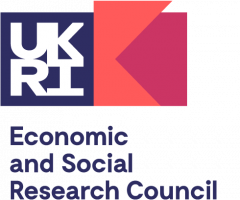
Research: Toddlers, Tech and Talk
Understanding how very young children learn language and literacy at home in a digital age.
About
Research summary
- June 2022 to December 2024
This project investigated how the home lives of children aged three and under intersect with digital technologies in diverse families in England, Northern Ireland, Scotland and Wales.
The research team has built knowledge about how very young children develop early talk and literacy with digital technologies at home, and how families support their learning and wellbeing with technology.
Through survey research, interviews and innovative participatory research methods, the project has generated new understandings of contemporary home learning environments.
Background
Led by Prof Rosie Flewitt at Manchester Met, the project was a collaboration with the universities of Lancaster, Queen’s Belfast, Strathclyde and Swansea.
From birth, almost every child in the UK has a digital footprint, and digital media begin to influence how they live and learn.
The project has resulted in a robust body of empirical evidence about the language and literacy learning of children aged three and under.
We have used innovative and flexible ways to research the home and to work sensitively with children and families in diverse communities.
Outputs from the project will inform the practical and conceptual understanding of the contemporary home learning environment. We developed resources, and identified areas for future research.
The project’s advisory board included experts from health and social care, childhood charities, national literacy organisations and early childhood care and education professionals from across the UK. It also featured directors of world-leading projects connected with digital childhoods in Australia and Finland.
Most children are born into homes where digital technologies are embedded in the everyday fabric of family life, influencing their early language and literacy encounters. There’s a pressing need to find out much more about how very young children interact with, around and through digital media.
Most children are born into homes where digital technologies are embedded in the everyday fabric of family life, influencing their early language and literacy encounters. There’s a pressing need to find out much more about how very young children interact with, around and through digital media.
Research methods
Our research approach in this study was participatory, meaning we co-designed our methods with our participants.
We had a wealth of experience to draw on, while recognising that families know their children best.
Through our ethics-first approach, we have worked to ensure our methods were inclusive of diverse social, ethnic and linguistic communities while adapting to individual family beliefs and practices.
Research outputs
Toddlers, Tech and Talk Summary Report - available on Open Access.
We committed to creating a rich and diverse set of resources, in dialogue with various audiences. Further outputs include:
- articles for parent and professional journals
- blogs and contributions to existing websites
- reports for families, diverse professional sectors, educators, families and policymakers
- academic conference papers and journal articles
Publications
- Flewitt, R., & El Gemayel, S. (2023). Young Children And Digital Technology At Home. Froebel Trust.
Media reporting
- Community Radio Interview, North Manchester FM.
- Flewitt, R., and Arnott, L. (2023). Digital Technology and Literacy: Looking at the impact of digital technology in the home on language and literacy in early years. Early Years Educator.
- El Gemayel, S., Flewitt, R., and Arnott, L. (2023). Toddlers, Tech and Talk: What Does Research Literature Tell Us? Early Years Educator.
- Arnott, L., and Mevawalla, Z. (2024). Participatory methods for understanding 0-3s’ technology use in family homes. Early Years Educator.
- Winter, K. (2024). Tech use: Emerging survey results. Early Years Educator
Team
Research team
Principal investigator
Co-investigators
- Prof Julia Gillen, Lancaster University
- Prof Karen Winter, Queen’s University Belfast
- Dr Katrina McLaughlin, Queen’s University Belfast
- Dr Lorna Arnott, University of Strathclyde
- Dr Zinnia Mevawalla, University of Strathclyde
- Prof Janet Goodall, Swansea University
Researchers
- Dr Sandra El Gemayel
- Dr Sabina Savadova, Lancaster University
- Dr Andy Dalziell, University of Strathclyde
- Sarah Timmins, Swansea University
Project coordinator
Funding
With funding from

Economic & Social Research Council
Contact
Contact us
For general enquiries about our:
- children and childhood research group, please contact its lead Prof Rachel Holmes
- language and literacy research group, please contact its lead Prof Kate Pahl


